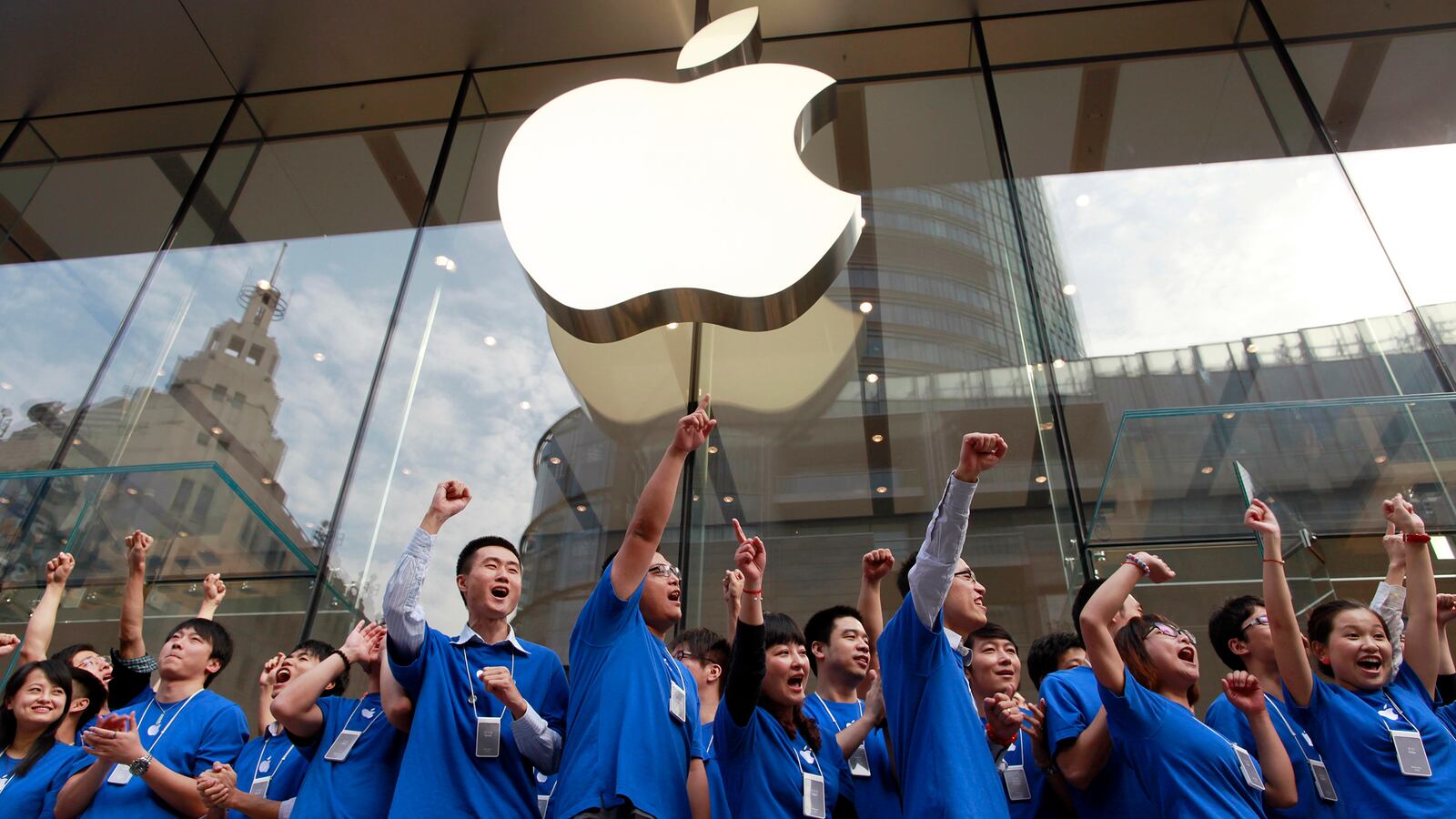To gain advantage in the intensifying “trade war” with the United States, China threatened on Tuesday to retaliate against Apple Inc with an incredible public statement.
“China is by far the most important overseas market for the U.S.-based Apple, leaving it exposed if Chinese people make it a target of anger and nationalist sentiment,” People’s Daily stated in an article titled “Strong Sales of U.S. Brands Including Apple Give China Bargaining Chips in Trade Row.”
The article, reprinted from a sister newspaper, went on: “China doesn’t want to close its doors to Apple despite the trade conflict, but if the U.S. company wants to earn good money in China, it needs to share its development dividends with the Chinese people.”
The article in the Communist Party’s—and therefore, China’s—most authoritative publication added one more implied threat: “It is impractical and unreasonable to kick the company out of China, but if Apple wants to continue raking in enormous profits from the Chinese markets amid trade tensions, the company needs to do more to share the economic cake with local Chinese people.”
In a country filled with customers crazy for Apple products, the only way the American brand would become a target of ire is if the political leadership was determined to make it so, as Beijing has done with other foreign businesses. Chinese officials have organized protests against a host of Japanese companies and, more recently, Lotte Group, the South Korean retail and tourism conglomerate.
The Communist Party has also gone after Apple before. In March 2013, for instance, Chinese officials took a series of actions, suggesting they were seeking to undermine the brand.
“Apple’s long-term future in the People’s Republic was in grave doubt long before President Trump challenged the U.S.-China trade status quo,” Alan Tonelson, a Washington, D.C.-based trade expert, told The Daily Beast. “Beijing’s economic game plan has always called for kicking out or marginalizing foreign companies as soon as Chinese entities could adequately create their own products and services. With several Chinese smartphone producers nearing full global competitiveness, Beijing had already been undermining the company.”
But while official campaigning against Apple by Chinese ruler Xi Jinping had worked in the past, there has been a remarkable lack of “patriotic” sentiment this time expressed against either the United States or Apple.
Why? For one thing, there is a sizable group of elite Chinese who happen to agree with Trump or at least with the actions of his administration. “People I have spoken with in China universally acknowledge the U.S. is justified in launching the trade war,” Charles Burton of Brock University told me Thursday. On just-completed travel from one end of China to the other—Shanghai, Kunming, and Linyi—the noted Canadian China-watcher heard people say that American charges of “unfair trade practices and coercive or illegal acquisition of U.S. technology” are “fully valid.”
Burton noticed something else, also suggested by others in recent days. “There is,” he told me, “a general consensus that Mr. Xi has brought shame on China by his dishonorable trade policies, which violate the core teachings of Confucian tradition upholding honesty and openness in all dealings as the mark of the cultured and upright government official.”
Not all observers have put this observation in the context of ancient philosophical thought, but there is, around China, an evident unease at flagrant intellectual property theft, especially now that Trump has made what looks like an uncompromising stand on the issue.
At the beginning of this year, there was a general consensus in Beijing that Xi could manage Trump, that the American’s “China, China, China” rhetoric was merely campaign-trail blather. This view at first looked to be correct, given Trump’s effusive words for Xi at and following the Mar-a-Lago summit last April.
Until recently, it looked like Trump was following in the footsteps of Presidents Clinton, Bush, and Obama, who all talked tough on China as they sought office and then defaulted to decades-old “engagement” policy once entering the White House.
That’s changed. Academic Yang Qijing of Beijing’s Renmin University has since become a star in the Chinese capital because he did not dismiss Trump’s trade rhetoric, and Xi Jinping is now under relentless attack for provoking the once-sleeping Americans.
Communist Party bigwigs are at this moment thought to be at their semi-secret annual retreat at Beidaihe, where the new conventional wisdom is that Party elders will chop China’s once-absolute supremo down to size.
If Xi is in fact diminished, Apple, among other companies, will be safer. Xi is thought to be behind the plan to launch “precision strikes” on U.S. businesses, in other words, holding them as hostages.
And that brings us back to Apple. CNBC’s Jim Cramer thinks Beijing will leave the company alone because attacking it would be “playing with fire.” Cramer, therefore, predicts Chinese officials will “target some other companies first.”
But if Beijing goes after any American companies, it would more likely be an historic mistake that would warn others to stay away from China. As The New York Times reported Wednesday, trade friction is already forcing multinationals to think of moving supply chains “away from China.” Xi’s retaliation could get them to do more than think about it.
That’s what many in Beijing have been worried about. After especially pugnacious comments from Xi late last June, the South China Morning Post quoted officials saying that “targeting U.S. firms in China has never been on the cards.”
Therefore, Tuesday’s extortionist demand by People’s Daily looks like it will wound Xi Jinping and his China more than the United States and its iconic company.





